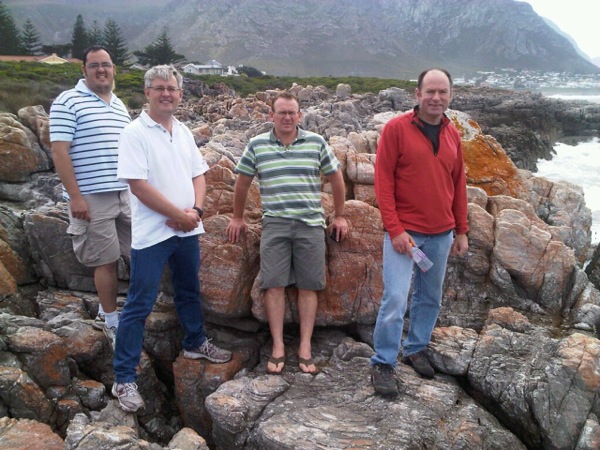It is incredible to be back home!
If I was not so jet lagged I would have mustered all of my creative juices to write something as poetic and profound as my friend Pete did about his return home. All I can say (like many of my first year students do), is that I agree with him, and with what he said, and I wish I could say it the same way. Megie, Courts and Liam - I love you, and coming home to you is the best possible feeling in the world!
I arrived home just before 8pm last night after being on the road for 28 hours... The coach, the tube, an express train, two aeroplanes, a few airport buses, and the car home. Whilst I didn't ride a single Vespa to get back, I did wear my favourite Vespa T-Shirt! The trip was great, and even with missing my family, and having to travel so far, I would do it all over again. I have been challenged and stretched to grow.
I slept well last night. I didn't mind getting out of bed just before 6am to make breakfast and coffee for the family. I had daydreamed about that simple act of service, one of my daily routines, quite a few times while I was away. After taking Courtney to school - and having a good chat about her party, her friends, and her recent conquests in Shrek (on her gameboy) I rejoiced to worship in the College chapel. The idiom of worship was truly African, we sang, danced, played the bell and the beat, and used many of our 11 official languages to do so.... and I knew that I was home!
I have often felt that liminal feeling, common to many white Africans, of being too white to be truly African, but too African to be European. However, this morning I knew that I belonged. These are my people - I am, because they are. Here it is not because of my race that I belong. Rather, it is because we are a community that I feel truly human, located, understood, appreciated, and loved.
Here's one of the last photos that I took before leaving Christ Church in Oxford. From left to right are myself, Dr Mercy Amba Odoyuye, Dr Richardson, and Dr Colin Smith. Auntie Mercy is one of our mother's in the faith. She has done so much to highlight the concerns and struggles of African Christians, and in particular the concerns of African Christian women. She is one of the most prophetic and Christ-like people I have ever met - gentle, yet just. Colin is a circuit Superintendent from the UK and was one of the co-chairs of the Oxford institute. I learned so much about the kind of calm leadership that is required to manage important processes, and people who sometimes imagine themselves to be more important than they are. He handled the institute with such dignity, respect, and care. It is with much thanks to him that we got such good work done over the 10 days in Oxford.

Now, of course, I need to get my head around what I shall be sharing in Malaysia at STM. The presentation and preparation for the Church conference is all but done. Most of the preparatory work for the seminary is also done, and so now it is just a matter of putting the final touches to it.
This is more or less what I am going to cover at STM:
Methodist Church in Southern Africa's response to oppression, violence and abuse before, during, and after apartheid. I will speak about:
- The effects of the missionaries, and English colonization, on Southern African church and society.
- The heresy of 'apartheid' and the effects of that ideology on Southern African society. I will chart the Church's response to this evil using the work from my paper for the Oxford institute together with papers written by Henk Pieterse, Ted Jennings, Joerg Rieger, and Ivan Abrahams, as well as some information supplied by Demetris Palos (this will probably be the Lion's share of the discussion).
- The challenges of reconstruction and development in post-apartheid Southern Africa (here I shall focus HIV / AIDS, economic development, crime and violence, racial reconciliation. In particular, I will address how the Church has sought to deal with these issues through its mission strategy, and through the training of laity and clergy).
Here's another memorable moment for me -

In this photograph are Aileen and Randy Maddox. Aileen was also one of the Institute organizers. Randy calls her his better two thirds! If that is the case she must be truly remarkable! I look forward to getting to know them much better in the future. Randy should be well known to most Methodists - he is a prominent Wesleyan scholar who now teaches at Duke Divinity school. My students will know him since his book "Rethinking Wesley's theology" is one of their prescribed books. By the way, for those who haven't yet read it, Peter Grassow (referred to above) has an oustanding chapter entitled "Wesley and revolution: A South African perspective" (Chapter 12). It is well worth reading.
 Wednesday, March 19, 2014 at 4:00PM
Wednesday, March 19, 2014 at 4:00PM 







